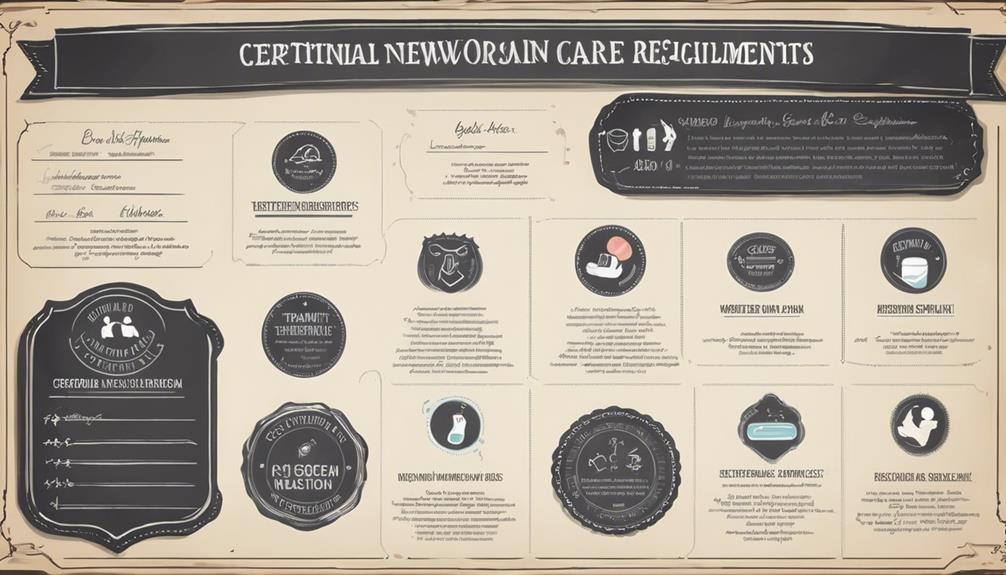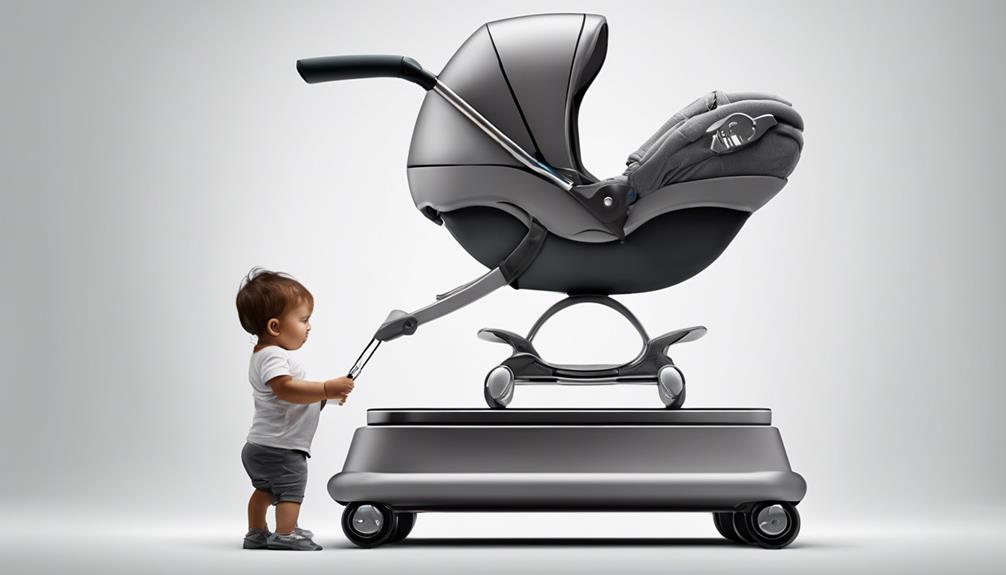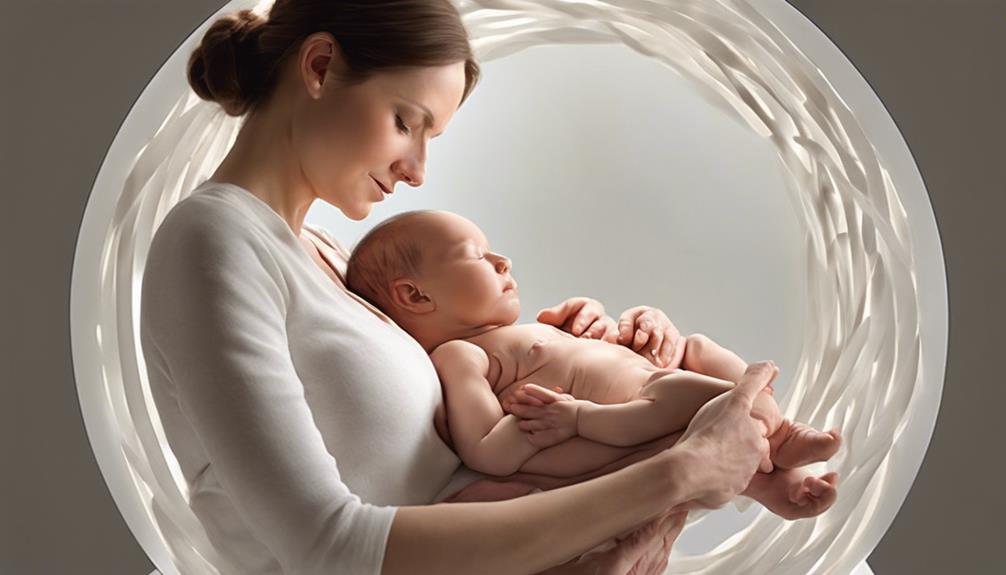In the path to mastering the role of a Newborn Care Specialist, recognizing the crucial equilibrium between academic learning and practical application is essential.
While the academic background lays the foundation, the practical application of skills is where true expertise is honed.
Exploring the ten essential education requirements for NCS professionals can shed light on the multifaceted nature of this specialized field, offering insights into the diverse skill set needed to excel in newborn care.
Key Takeaways
- Specialized training in newborn care and certifications in infant CPR and first aid are essential.
- Hands-on experience with newborns, internships, and volunteer work provide valuable practical skills.
- Strong communication, problem-solving skills, and patience are crucial for newborn care specialists.
- Continuous professional development through workshops, certifications, and networking enhances expertise in newborn care.

Jeep Sport All-Terrain Stroller Wagon by Delta Children - Includes Canopy, Parent Organizer, Adjustable Handlebar, Snack Tray & Cup Holders, Grey/Olive Green
KEEPS KIDS AND PARENTS COMFORTABLE: Large, adjustable canopy with extendable sunshade provides protection | Adjustable push or pull...
As an affiliate, we earn on qualifying purchases.
Academic Background Requirements
When considering becoming a Newborn Care Specialist, it's important to meet specific academic background requirements to begin training effectively. A high school diploma or equivalent serves as the typical starting point. However, some training programs may have additional prerequisites, such as a minimum GPA or coursework in child development.
While not always mandatory, previous experience in childcare or related fields can greatly benefit individuals pursuing a career as a Newborn Care Specialist. It's worth noting that academic background requirements can vary depending on the specific training program or certification organization.
Despite these variations, one common thread remains essential: a genuine passion for caring for infants and supporting families. Demonstrating this heartfelt commitment to newborn care and family well-being is essential, regardless of one's academic background. By ensuring that individuals meet these academic prerequisites, they can commence on their training journey equipped with the foundational knowledge needed to excel in this deeply rewarding profession.
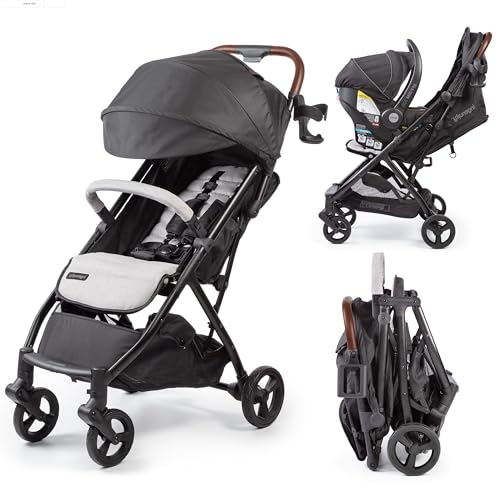
Ingenuity Ingenuity 3Dquickclose CS+ Compact Fold Stroller – Lightweight Stroller with Oversized Canopy, Extra-Large Storage and Compact Fold, Gray
The Ingenuity 3Dquickclose CS+ Compact Fold Stroller is lightweight and easy to maneuver, making it the perfect stroller...
As an affiliate, we earn on qualifying purchases.
Specialized Training Programs
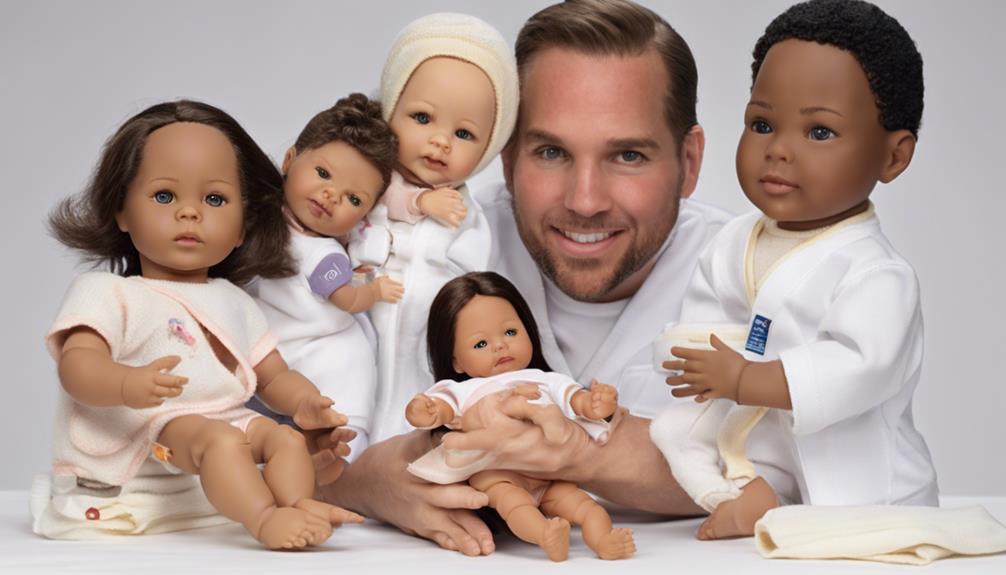
Specialized training programs for newborn care specialists play a vital role in our professional development.
Program accreditation guarantees a high standard of education and practical skills acquisition.
These courses offer a flexible curriculum that caters to the diverse needs of caregivers in the field.
Program Accreditation Importance
Accreditation from organizations like CACHE is crucial to secure the quality and credibility of specialized training programs for newborn care specialists. When selecting a program, it's imperative to take into account accreditation for the following reasons:
- Guarantees adherence to industry standards, best practices, and ethical guidelines in newborn care training.
- Demonstrates a commitment to professional development and excellence in newborn care.
- Signifies that the training program meets rigorous criteria set by reputable organizations in the field.
Hands-On Practical Experience
Moving from the importance of program accreditation, hands-on practical experience in specialized training programs for newborn care specialists plays a pivotal role in equipping individuals with essential skills and confidence. Practical learning is essential for mastering techniques like feeding, soothing, and diaper changing, which are important for providing high-quality care to newborns. These training programs focus on real-life scenarios, preparing specialists for diverse situations they may encounter while caring for newborns and their families. The hands-on experience gained through these programs enhances the specialist's ability to offer personalized care and support. Below is a table highlighting the key aspects of hands-on practical experience in specialized training programs for newborn care specialists:
| Aspect | Description | Importance |
|---|---|---|
| Feeding Techniques | Hands-on practice in various feeding methods such as breastfeeding and bottle feeding. | Vital for ensuring proper nutrition and growth. |
| Soothing Methods | Learning how to calm newborns through techniques like swaddling and gentle rocking. | Essential for promoting infant relaxation and sleep. |
| Diaper Changing | Practicing proper diaper changing procedures and maintaining hygiene standards. | Important for newborn care and preventing infections. |
Curriculum Flexibility Options
Flexibility in curriculum options within specialized training programs for newborn care specialists allows individuals to tailor their education towards specific areas of focus such as lactation consulting, sleep training, and multiples care. This tailored approach enhances skills and knowledge in important areas for newborn care specialists.
- The Newborn Care Specialist Association offers specialized courses in preemie care, reflux management, and postpartum depression.
- Continuing Education programs provide in-depth understanding of safety measures, developmental milestones, and communication strategies.
- Specialized training programs guarantee a well-rounded education, preparing individuals for the diverse responsibilities they'll face as newborn care specialists.

Graco Ready2Jet Compact Stroller – Overhead Friendly Compact Travel Stroller with Automatic Fold, Kingston
Automatically folds to a compact size with one-hand activation for multi-tasking families
As an affiliate, we earn on qualifying purchases.
Hands-On Experience

When it comes to newborn care specialist training, practical skills training and clinical placement opportunities play an essential role.
These experiences allow us to apply theoretical knowledge in real-life settings, honing our abilities in feeding, diapering, and calming newborns.
Practical Skills Training
Practical skills training in newborn care specialist education equips individuals with essential hands-on experience in feeding, diapering, and soothing techniques, making sure they're adept at providing thorough care for infants.
This training involves:
- Practicing safe sleep practices
- Mastering swaddling techniques
- Creating a conducive sleep environment for newborns
These hands-on experiences help develop confidence in handling newborns, interpreting their cues, and responding effectively to their needs. By covering bathing, umbilical cord care, temperature regulation, and recognizing signs of distress or illness in newborns, practical skills training ensures that Newborn Care Specialists are well-prepared to deliver quality care and support to families with infants.
Clinical Placements Opportunities
Moving from practical skills training, the next phase involves gaining invaluable hands-on experience through clinical placements, providing a real-world setting to work with newborns. During these placements, students acquire practical skills such as feeding, diapering, soothing, and general newborn care under the supervision of experienced professionals.
This hands-on experience allows students to apply the theoretical knowledge gained from coursework to real-life scenarios, enhancing their understanding and competence in newborn care. Clinical placements offer a unique opportunity for students to observe and participate in the daily responsibilities of a Newborn Care Specialist, fostering confidence and skill development.

Graco Modes Pramette Travel System, 3-in1 Modular Carseat Stroller Combo, Infant Car Seat Carrier to Toddler Stroller, Includes the SnugRide 35 Car Seat, Ellington
Stroller Modes: Transforms from an Infant Car Seat Carrier to Infant Pramette, to Toddler Stroller
As an affiliate, we earn on qualifying purchases.
CPR and First Aid Certification

Obtaining certification in CPR and first aid is an important requirement for newborn care specialists to effectively handle emergency situations involving infants. Being prepared to respond promptly and correctly in critical health crises can make a significant difference in saving a newborn's life.
Here are three key points to contemplate regarding CPR and first aid certification for newborn care specialists:
- Life-Saving Skills: CPR certification equips specialists with the knowledge and skills needed to perform cardiopulmonary resuscitation on infants, which can be life-saving during emergencies.
- Immediate Response: First aid training covers basic medical care techniques specific to newborns, ensuring specialists can provide immediate assistance in case of accidents or injuries.
- Employer Expectations: Employers often require newborn care specialists to be certified in CPR and first aid for infant safety, reflecting the importance of being prepared for any unexpected health situations that may arise.
Certification in CPR and first aid not only demonstrates competency but also instills confidence in both the specialist and the families they serve.
Newborn Care Specialist Courses
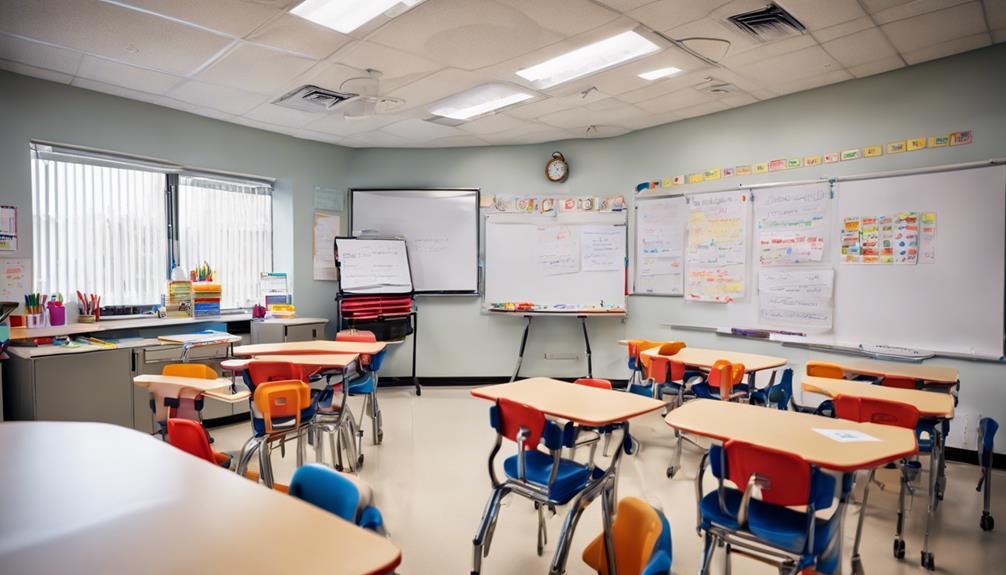
Newborn Care Specialist courses encompass an all-encompassing range of topics essential for providing expert care to infants, including breastfeeding, sleep conditioning, scheduling, and baby development. These courses explore specialized areas such as formulas, reflux, colic, safety measures, and postpartum depression awareness. They offer thorough training on multiples care, various scheduling techniques, and effective communication strategies for newborn care. Practical hands-on experience is an integral part of the curriculum, ensuring mastery of the necessary skills for success in this profession. Completion of these courses results in certification, distinguishing individuals as skilled professionals in the field.
| Topics | Description |
|---|---|
| Breastfeeding | Techniques and support for successful nursing |
| Sleep Conditioning | Methods to establish healthy sleep patterns |
| Scheduling | Creating routines beneficial for both baby and family |
| Baby Development | Understanding milestones and growth stages |
Infant Health and Development Knowledge
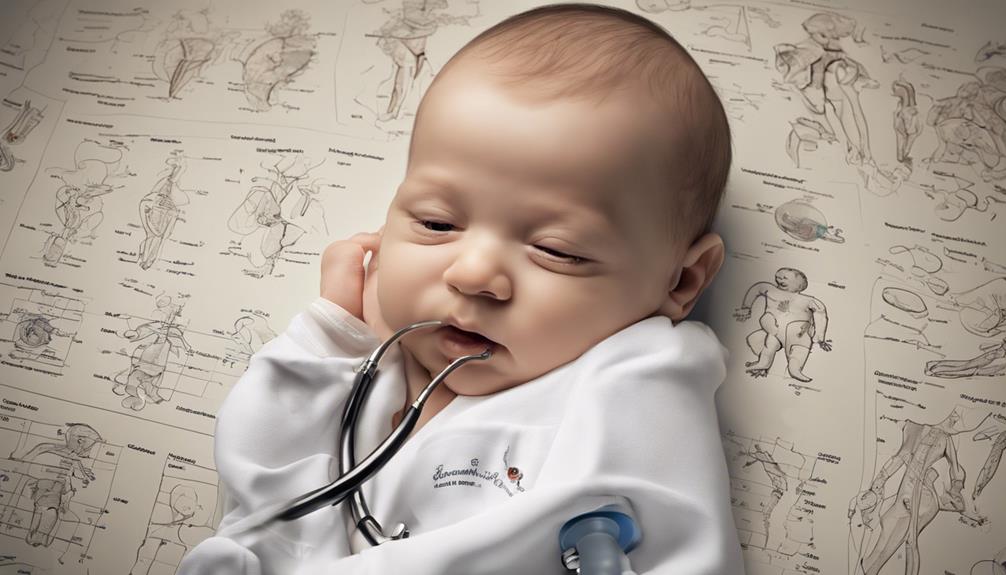
Understanding growth milestones tracking and scheduling developmental assessments are fundamental aspects of ensuring the healthy progression of newborns.
As newborn care specialists, we focus on recognizing these markers to monitor growth and identify any potential delays early on.
Growth Milestones Tracking
Monitoring a baby's growth milestones involves observing their physical, cognitive, and social development to track progress and identify any delays. Understanding the significance of growth milestones is critical for ensuring a baby's healthy development.
Here are three essential aspects to keep in mind when tracking growth milestones:
- Physical Development: Keep an eye on milestones like rolling over, sitting up, crawling, and walking.
- Cognitive Development: Monitor progress in areas such as recognizing faces, responding to sounds, and developing language skills.
- Social Development: Watch for behaviors like smiling, babbling, making eye contact, and showing interest in others.
Developmental Assessments Scheduling
Observing a baby's growth milestones involves scheduling developmental assessments to track their progress and guarantee peak health and development. By understanding newborn care and infant health and development, we can identify any concerns early on, enabling timely interventions. Monitoring a baby's progress through these assessments is vital for offering tailored care and necessary support. Scheduling these assessments at specific ages or stages allows us to closely monitor and promote the baby's overall well-being effectively. Having knowledge of infant health and development is essential in creating a nurturing environment that fosters best growth and development.
| Developmental Assessments | Scheduling | Infant Health and Development |
|---|---|---|
| Track growth milestones | Ensure timely assessments | Identify potential issues early on |
| Monitor progress | Schedule at specific ages/stages | Provide appropriate care and support |
| Promote overall well-being | Tailor assessments accordingly | Foster best growth and development |
Communication and Interpersonal Skills

Effective communication skills are foundational for establishing trust and rapport with parents and caregivers in the role of a Newborn Care Specialist. As a Newborn Care Specialist, our ability to communicate effectively plays a critical role in providing support to families and ensuring the well-being of the newborn.
Here are three key aspects highlighting the importance of communication and interpersonal skills in this role:
- Building Trust: Establishing trust with new parents and caregivers is essential for creating a supportive environment where they feel comfortable sharing their concerns and seeking guidance.
- Addressing Needs: Effective communication helps in understanding the unique needs and concerns of each family, allowing us to tailor our care approach accordingly.
- Collaborative Problem-Solving: Clear communication fosters collaboration between the NCS and the family, enabling us to work together in addressing newborn care challenges and finding solutions that meet everyone's needs.
Parent Education and Support Training

Parent education and support training equips Newborn Care Specialists with essential skills and knowledge to empower parents in caring for their infants, focusing on areas like newborn care, development, and safety. This specialized training explores important topics like feeding techniques, understanding sleep patterns, mastering soothing methods, and ensuring a secure environment for the newborn. By educating parents on these aspects, Newborn Care Specialists play a pivotal role in enhancing parental confidence and competence.
Additionally, parent education and support training goes beyond just imparting practical knowledge; it also involves providing emotional support, guidance, and access to valuable resources. This all-encompassing approach enables Newborn Care Specialists to assist parents in maneuvering the various challenges that come with early parenthood. By developing strong relationships with families through effective education and support, these specialists contribute significantly to promoting positive parenting practices and fostering a nurturing environment for the infant's growth and development.
Licensing and Certification
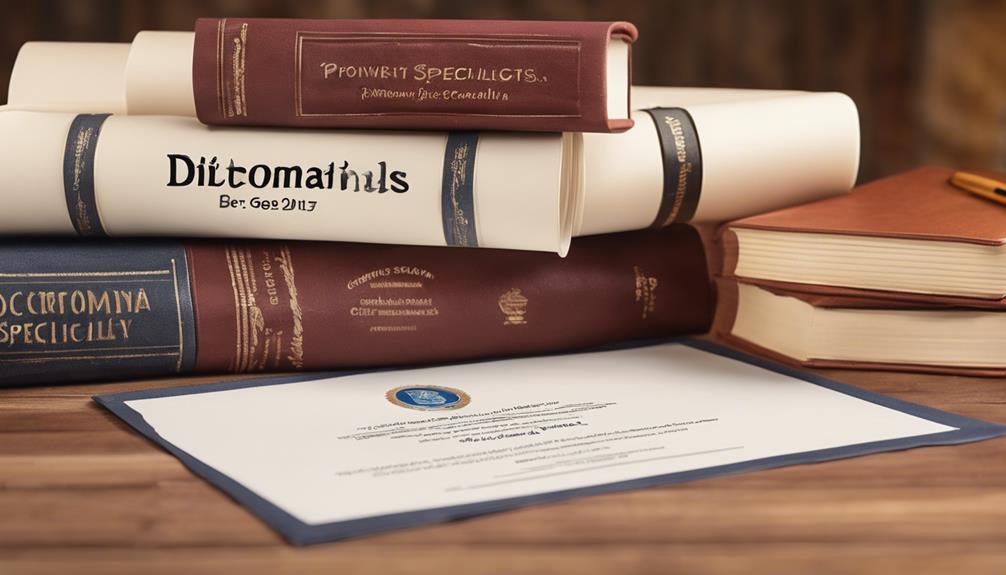
Acquiring licensure and certification in newborn care specialization serves as a significant marker of professional assurance and dedication in the field. The Newborn Care Specialist Association (NCSA) offers certification at various levels to validate skills and expertise, ensuring high standards of care for newborns.
Here are three key points to contemplate regarding certification:
- NCSA certification is highly recommended for newborn care specialists to enhance their professional credibility.
- Certification from NCSA requires completion of approved training courses, working hours, passing an exam, and meeting specific requirements, showcasing a commitment to ongoing education.
- Certified newborn care specialists are more likely to attract clients and secure higher-paying positions in the field due to the validation of their skills and expertise.
Continued Professional Development

In the domain of newborn care specialization, staying abreast of developments through continued professional development is essential for maintaining high standards of care and meeting industry demands effectively. Continued professional development for newborn care specialists encompasses staying updated on a range of important aspects, including health, safety, nutrition, professionalism, and child development.
Engaging in ongoing education not only guarantees that specialists are equipped to provide excellent care but also helps them adapt to industry trends and demands efficiently.
One valuable avenue for continued professional development is mentorship. By connecting with expert mentors through programs, agencies, or professional organizations, newborn care specialists can gain invaluable insights and guidance. These mentors, often experienced professionals in the field, can offer support on a variety of topics such as newborn activities, nutrition, business aspects, and best practices in care.
Learning from seasoned professionals through mentorship can greatly enhance skills, expand knowledge, and pave the way for career advancement in the specialized field of newborn care.
Frequently Asked Questions
What Does a Newborn Care Specialist Do?
We provide overnight care, feeding support, and guidance to parents, ensuring a smooth switch to parenthood. Our expertise in newborn development, health, and safety allows us to troubleshoot issues, establish routines, and foster strong parent-child bonds.
What Is NCS Training?
NCS training is a thorough program that equips us with essential skills like newborn care, breastfeeding support, and safety protocols. It includes hands-on practice, emphasizes communication strategies, and covers special topics such as multiples care.
Is a Newborn Care Specialist Worth It?
Yes, hiring a Newborn Care Specialist is worth it. They provide expert support for new parents, enhance newborn care skills, and make legal compliance. Certification leads to higher pay. Specialized training boosts demand.
What Is the Difference Between a Newborn Care Specialist and a Postpartum Doula?
We offer insight into the distinctions between a Newborn Care Specialist and a Postpartum Doula. Specialists focus on newborns' needs like feeding and sleep, while Doulas provide emotional support to mothers during postpartum recovery. Both roles are essential in supporting families.
Conclusion
To sum up, becoming a certified Newborn Care Specialist requires dedication, specialized training, and ongoing education to provide the highest level of care for newborns and their families.
Like a well-tended garden, our expertise must be nurtured and cultivated to blossom into a trusted resource for those in need of newborn care support.
Let's continue to grow and flourish in our knowledge and skills to make a meaningful difference in the lives of newborns and their families.
